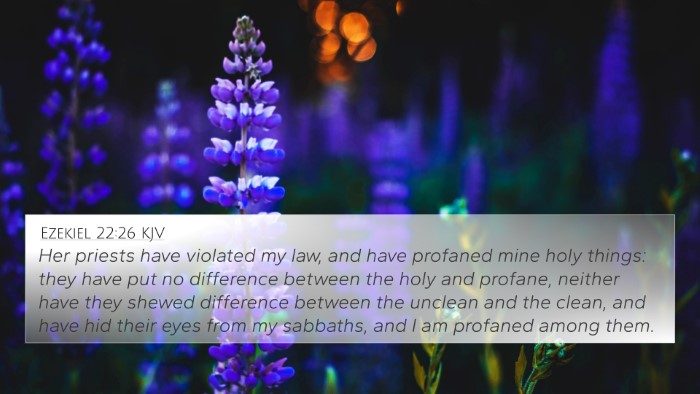Ezekiel 13:19 - Meaning and Interpretation
Ezekiel 13:19 states, "And will ye pollute me among my people for handfuls of barley and for pieces of bread, to slay the souls that should not die, and to save the souls alive that should not live, by your lying to my people that hearken to lies?" This verse addresses the condemnation of false prophets and their manipulative practices amongst God's people. Below is an exploration of its meaning through various commentaries.
Summary of Ezekiel 13:19
This verse highlights several key points:
- Pollution of God’s Name: The false prophets are accused of degrading the sanctity of God's name by leading His people astray.
- Moral Corruption: The prophets prioritize material gain over spiritual integrity, influenced by trivial incentives like "handfuls of barley."
- Spiritual Consequences: Their dishonest actions result in the death of souls that should live and the preservation of those destined for ruin.
- Listening to Lies: The verse points to the people's gullibility, as they listen and adhere to the deceptive words of these prophets.
Insights from Public Domain Commentaries
Various commentators provide deeper insights into this verse:
Matthew Henry's Commentary
Henry emphasizes that the focus of this verse is on the misuse of divine authority by the prophets, who were supposed to guide the people towards truth. Instead, they betray their mission for mere financial or material gain, which in turn leads to the moral decline of the community.
Albert Barnes' Notes on the Bible
Barnes notes that the primary sin of the false prophets is their wilful deception and manipulation of the people. He highlights the seriousness of their actions, showing how they can alter God’s plans for the people through their lies, leading to both spiritual and physical devastation.
Adam Clarke's Commentary
Clarke provides an understanding of the socio-economic context, explaining that the 'handfuls of barley' symbolize the trivial incentives that can lead one to betray their calling. He also points to the importance of discernment among the people, urging them to seek true prophets instead of those who mislead for profit.
Thematic Connections and Cross-References
The themes in Ezekiel 13:19 resonate throughout the Bible. Here are some relevant cross-references:
- Jeremiah 23:16-17: Condemnation of false prophets who lead people to believe in their deceptive visions.
- Micah 3:5: A rebuke against prophets who declare peace only when they are fed or rewarded.
- Matthew 7:15: A warning from Jesus about false prophets who come in sheep's clothing.
- 2 Peter 2:2: A reference to false teachers among the people who will introduce destructive heresies.
- Ezekiel 14:9-10: God's judgment on the prophet who misleads His people.
- 1 Timothy 6:5: A warning against godliness as a means to financial gain, hinting at the same motives as in Ezekiel 13:19.
- Lamentations 2:14: The prophets failing to reveal the seriousness of the people's sins, much like the deception spoken against them in this verse.
Understanding the Importance of Cross-Referencing
Cross-referencing Bible verses is an essential tool for deeper theological understanding. Here are several tools for Bible cross-referencing to improve scriptural insights:
- Bible Concordance: A powerful resource for locating specific terms, themes, and references.
- Bible Cross-Reference Guide: A guide that connects verses based on themes and subject matter.
- Cross-Reference Bible Study: Methods for exploring interconnections between verses systematically.
- How to Use Bible Cross-References: Techniques for effectively employing cross-references in personal study or teaching.
- Bible Chain References: A method of following a sequence or chain of related verses for extensive study.
Conclusion
In summary, Ezekiel 13:19 serves as a potent reminder of the dangers posed by deceptive teachings and the importance of adhering to the truth of God's Word. Through studying this verse alongside its rich biblical context, one can better appreciate the themes of integrity, accountability, and spiritual discernment. Incorporating these insights into personal study can deepen one's understanding of Scripture and aid in recognizing connections between Bible verses.


















